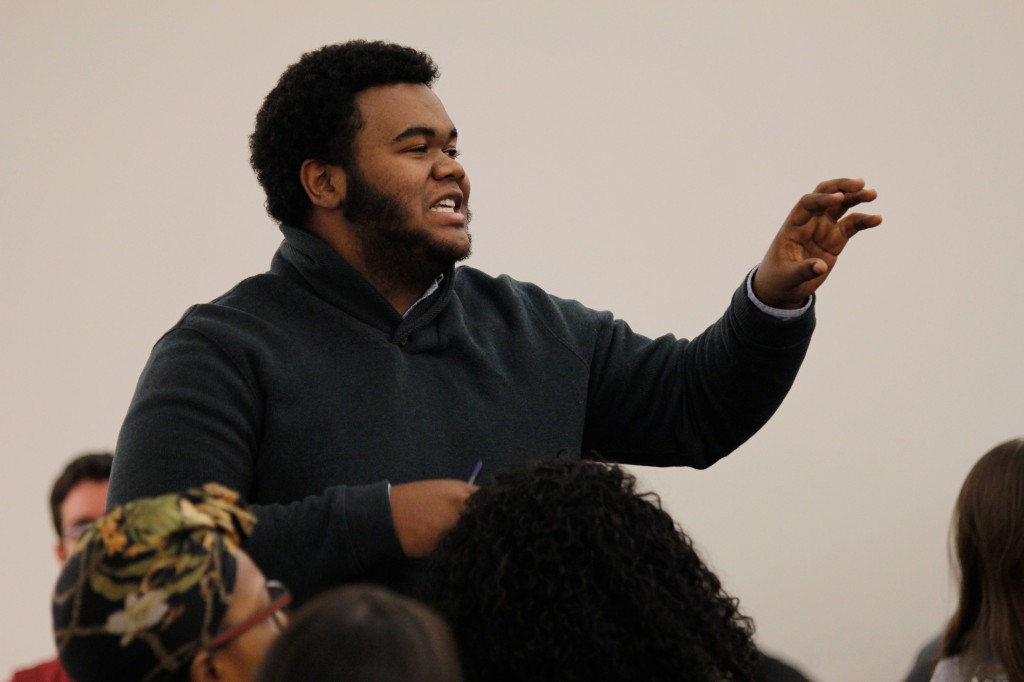
Since the end of protests about racial and ethnic discrimination last semester, many students have been waiting for an opportunity to personally address the administration staff, and Wednesday’s Town Hall Forum was supposed to provide that chance. But from the very beginning of the night, it became clear that tensions had not subsided.
Near the end of the fall semester, several protests on campus were staged in response to controversial court rulings around the country; after a town hall forum at the end of the semester, the group Students for Change released a list of 25 demands directed toward Binghamton University’s administration.
These demands, which ranged from facilitating a more diverse student and faculty body to requiring cultural competency training for campus, were presented to administrators last December.
In response, the Office for Diversity, Equity and Inclusion (ODEI) hosted its Town Hall Forum Wednesday night in the Old University Union. Administrators from various offices, including those from ODEI, academic affairs, student affairs, law enforcement and physical facilities came to address the demands aimed at their corresponding jurisdictions.
President Harvey Stenger was not in attendance due to an emergency trip to Albany, according to ODEI Director Valerie Hampton.
The event began with conflict almost immediately, when members of Students for Change said that the format of the event hindered the group’s ability to address the administrators.
While many students said they had expected administrators to present information as a panel to the entire audience, the ODEI had split the room into four large tables for smaller groups of students to rotate between during the event.
Several members of Students for Change stood up to argue with Hampton as she addressed the entire room and said that the forum unfairly split up students, many of whom had come to the event as one group.
“On behalf of Students for Change, we want to thank you for holding this meeting, and we’re really glad you’re concerned about our concerns,” said Jessica Dunn, a sophomore triple-majoring in sociology, political science and Africana studies. “But as per our email yesterday, this format doesn’t work for us; it divides us, so we can’t stand as a group. And in short, we can’t hold individual administrators accountable for what they say.”
When neither side agreed to compromise on the format of the event, more than half of the nearly 60 students in attendance walked out and many of them met privately in another room in the Union.
However, dozens of students, staff and faculty remained for more than two hours after the walkout to participate in the event as planned.
At one table, University Police Department (UPD) Chief Timothy Faughnan explained the hiring and work policies of UPD. He said that as a New York state police department, the standards for campus officers are very high and that all must undergo rigorous psychological training.
Faughnan said that while only a few of his sworn officers identified as black, Latino or Native American, his department has the highest percentage of minority, LGBTQ and female officers in Broome County.
“We recruit at New York state fairs, the Career Development Center, SUNY Broome, other college campuses,” Faughnan said. “Because we have a college requirement, the likely recruitment target is college campuses. Remember, we are also competing with 28 other SUNY campuses for the same job.”
Hampton and Provost Donald Nieman also each led discussions at other tables about issues of academics and cultural competency training respectively.
Nieman addressed the demand to instate a mandatory cultural competency general education requirement, which the groups suggested be expanded to include gender, sexual orientation and identity, as well as the existing African American, Hispanic and Native American studies.
He highlighted that it is not the administration, but the faculty that creates curriculum, and encouraged students to connect with the University Undergraduate Curriculum Committee to assess what students wanted by means of cultural diversity.
“To make any kind of change with this requires a lot of discussion, and a lot of connections between students and faculty,” Nieman said. “And I suspect there is a wide variety of perspectives among students.”
At the end of the event Hampton said that she would continue to discuss avenues for change, and was open to meeting with any student groups who wanted to continue the discussions.
“As tricky as the beginning of this may have been, and felt, I think it was productive,” Hampton said. “The ODEI is committed to continuing the dialogue and to figuring it all out.”
Student for Change’s List of Demands to the administration: http://www.nzinga.org/2015/02/13/updated-student-demands/


